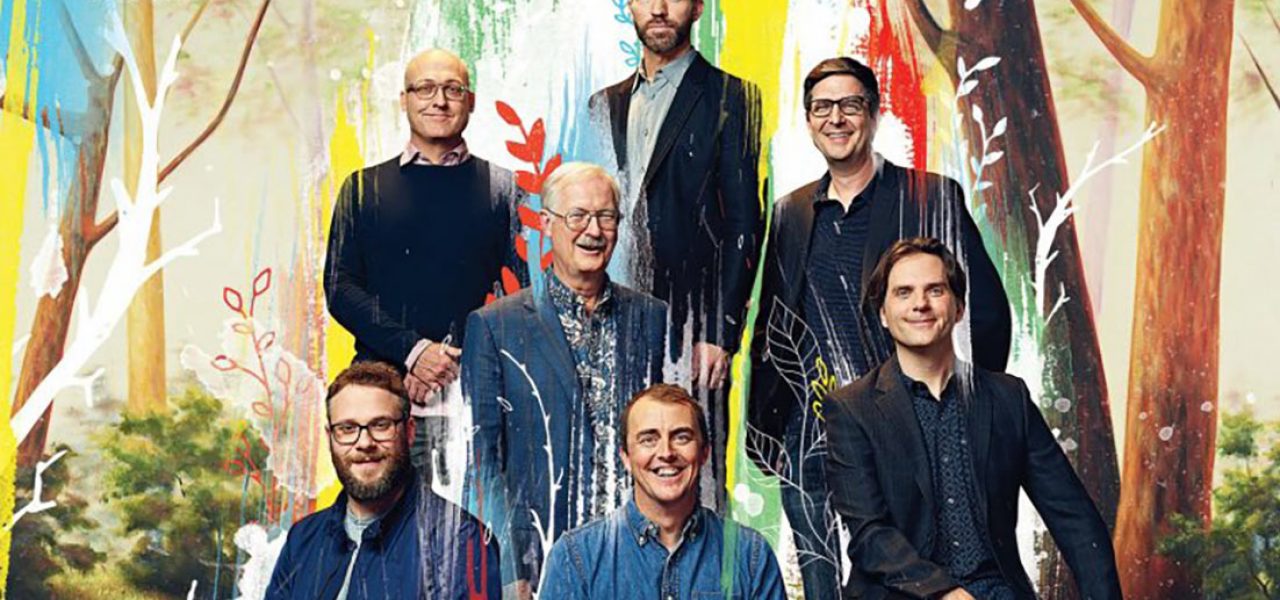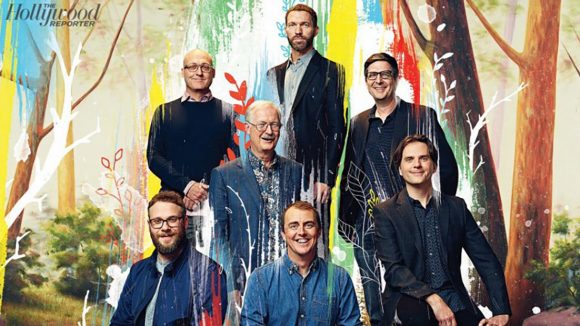

The Internet Is Disgusted By This Roundtable with Feature Animation Directors
Today, The Hollywood Reporter published its annual animation directors’ roundtable, and while this Oscar contenders roundtable isn’t formatted differently from year’s past, the reaction on the Internet has been very different.
The distaste for this year’s roundtable has much to do with THR’s decision to interview seven white male filmmakers, and then structure significant parts of the discussion around issues of representation, feminism, and cultural sensitivity. The video is entitled: “Animation Roundtable: Seth Rogen and 6 More on Avoiding Ethnic Stereotypes and Creating Princesses Who Don’t Wear Uncomfortable Shoes.”
Now, it has to be pointed out that the only non-white, non-male director of a major American animated release this year was Jennifer Yuh, who co-directed (with a white male, of course) Kung Fu Panda 3. In other words, if American animation studios almost exclusively hire white males to direct animated features, then you can’t blame THR for who they chose to interview. (Variety published a similar roundtable and they switched out two of the white males for two other white males.)
No matter, the reaction on Twitter has been loud and vocal, with numerous industry artists joining the chorus of disapproval:
this headline and photo! this photo and headline! pic.twitter.com/TFjSHfdsT0
— Puja Patel (@senari) December 14, 2016
Go home 2016. It's really, really just over. pic.twitter.com/4jrYyqXEHU
— Rebecca Carroll (@rebel19) December 14, 2016
Yeah! The repressive days of the 9 Old Men are over! Wait… https://t.co/GYBMiLqqNk
— Dana Terrace (@DanaTerrace) December 14, 2016
Holy shit did Trump pick the Animation Roundtable on ethnic stereotype roundtable too? https://t.co/R2AnTbIueP
— Terry Bain (@terrybain) December 14, 2016
Can't make this up-Animation Roundtable: Seth Rogen, 6 More on Avoiding Ethnic Stereotypes/Breaking Princess mold. https://t.co/9kh23YV3K1
— LeSean Thomas (@LeSeanThomas) December 14, 2016
*SIGH* Look at these white guys discussing "Ethnic Stereotypes & How to Break the Mold of Princesses" in animation https://t.co/uUWAbcZqON
— Samantha (@SamKallis) December 14, 2016
Im still… reeling over….
A roundtable about… women and poc in animation…
With none… included…
— Sam King (@SamanthaCKing) December 14, 2016
Is this for real? It is for real. 6 white men panel on 'avoiding ethnic stereotypes and breaking the princess mold' https://t.co/VJ6YfPDKuM
— Domitille Collardey (@SoupFrog) December 14, 2016
Even Sausage Party writer Seth Rogen, who participated in the roundtable, has acknowledged the silliness of asking seven white gentleman about their takes on ethnic stereotypes and sexism:
Finally, you can see the white male take on ethnic stereotypes and sexism! Proud to break new ground. https://t.co/Pji1GWodm8
— Seth Rogen (@Sethrogen) December 14, 2016
About the roundtable, The Mary Sue offered this take:
Asking “Are you conscious of running the risk that some group could take offense?” and “Were you surprised?” to Musker and Rogen about backlash puts the focus on the creators’ feelings or some abstract angry internet commentator rather than the very real damage that careless and stereotypical representation cause. Maybe it’s time to replace “How can I tell this story in the best way?” with “Am I the best person to tell this story?”
Don’t expect such questions to be asked anytime soon though because if there’s one thing that movie studios like more than diversity, it’s making money, and the simple math is that putting white men in charge makes them piles of money. Animation, in fact, is currently having its strongest year ever at the box office. As long as studios are rolling in piles of your money, they have little incentive to increase diversity.
The sadder reality is that Hollywood actually believes it’s doing a better job at inclusiveness than before. In one exchange, Moana co-director John Musker explained how Disney pays lip service to authenticity by forcing their directors to do more research than it did in the past. Such research is apparently a new concept in Hollywood, even for Musker and other contemporary directors:
John Musker: Our development people arranged a really deep dive into the culture where it wasn’t tiki bars and that sort of thing. We met with anthropologists and archaeologists and linguists and cultural ambassadors. The challenge in our movie then was as we went forward, we kept those people involved, because we really wanted to be faithful to the culture and yet make a movie that hopefully would entertain people around the world that don’t know that stuff. It has to work as a movie on its own, but it was sort of an added challenge on this movie…I know, like when we did Aladdin, you talk about the research. It was during the first Gulf war, so our research, we went to the L.A. Convention Center. There was a Saudi Arabian expo. And that’s a true story…that’s as much as we [did]…
Mark Osborne: For Kung Fu Panda, we just Googled China.
There’s a similar tone-deafness to many of the questions and answers in the interview, like when Zootopia director Byron Howard explains that they interviewed women cops to help inform the development of Judy Hopps, or Trolls director Mike Mitchell talking about the progressiveness of not having a female lead wear shoes.
At the end of the day, I think the issue is far more nuanced than simply who should and shouldn’t be allowed to tell certain kinds of stories. There’s nothing wrong with John Musker and Ron Clements making a film about a culture different than their own, and there’s nothing wrong with Seth Rogen making an animated film that uses ethnic stereotypes for comedy. The issue really isn’t that they’re making these kinds of animated films at major American animation studios; the issue is that they’re the only people who are allowed to make animated features at these studios. (White males have made well over 95% of all the animated features in American film history.)
What rubs many people the wrong way is to see how Hollywood animated features are addressing issues of inclusivity, diversity, and tolerance more than ever before, yet the directorial ranks remain largely homogeneous and resistant to the very themes that the films are exploring. As long as Hollywood says one thing and does another, it’ll be hard to view a lot of these films as anything more than cynical corporate cashgrabs.
The whole roundtable, with Byron Howard (Zootopia), Garth Jennings (Sing), Travis Knight (Kubo and the Two Strings), Mike Mitchell (Trolls), Seth Rogen (Sausage Party), John Musker (Moana), and Mark Osborne (The Little Prince), can be viewed below.
